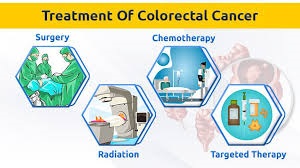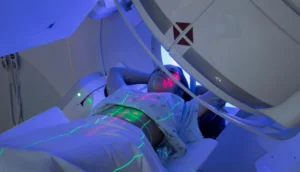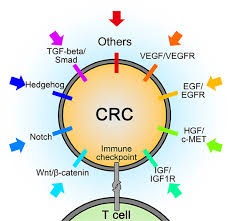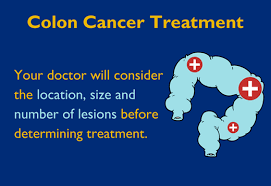COLON CANCER TREATMENTS

Colon cancer, also known as colorectal cancer, is a significant health concern worldwide. Fortunately, advancements in medical science have led to a range of effective treatment options. In this article, we will explore various treatment approaches for colon cancer, including surgery, chemotherapy, radiation therapy, and targeted therapy. Additionally, we will discuss how treatment choices are made based on the stage of cancer and the patient’s overall health. Finally, we will highlight the importance of palliative care for patients with advanced-stage colon cancer.
UNDERSTANDING COLON CANCER TREATMENT OPTIONS.
Treatment for colon cancer often involves a combination of therapies tailored to the individual’s specific situation. The primary treatment approaches include surgery, chemotherapy, radiation therapy, and targeted therapy. These methods plays a crucial role in managing the disease, depending on factors such as the stage of cancer, the location of the tumours, and the patient’s overall health.
Surgery

Surgery is often the first line of treatment for colon cancer, particularly when the cancer is localized. The primary goal of surgery is to remove the tumor and, if necessary, nearby lymph nodes to prevent the spread of cancer. There are several types of surgical procedures used to treat colon cancer:
- Colorectal Resection: This is the most common surgical procedure for colon cancer. During this operation, the surgeon removes the section of the colon that contains the tumor, along with some surrounding healthy tissue. The remaining ends of the colon are then reconnected. According to the American Cancer Society (2023), this procedure is typically recommended for early-stage colon cancer and can be done either through an open surgery or minimally invasive laparoscopic surgery.
- Colectomy: For more extensive cases, a colectomy might be necessary. This involves the removal of a larger portion of the colon, which may include a part of the rectum. A colectomy is usually performed if the cancer is larger or has spread to a significant portion of the colon.
- Palliative Surgery: In cases where colon cancer is advanced and cannot be completely removed, palliative surgery may be performed. This type of surgery aims to relieve symptoms, such as obstruction or bleeding, to improve the patient’s quality of life rather than to cure the disease.
Chemotherapy:

Chemotherapy involves the use of drugs to kill cancer cells or stop them from growing. It is often used in combination with other treatments or as a follow-up treatment after surgery. Chemotherapy can be administered in several ways:
- Systemic Chemotherapy: This method uses drugs that circulate throughout the body via the bloodstream to target cancer cells. Systemic chemotherapy is commonly used for colon cancer that has spread beyond the colon to other organs. According to the National Cancer Institute (2021), systemic chemotherapy can be given orally or through intravenous (IV) infusion.
- Adjuvant Chemotherapy: This type of chemotherapy is administered after surgery to eliminate any remaining cancer cells and reduce the risk of recurrence. Adjuvant chemotherapy is typically recommended for patients with stage II or III colon cancer.
- Neoadjuvant Chemotherapy: In some cases, chemotherapy may be given before surgery to shrink the tumor and make it easier to remove. This approach is used primarily for locally advanced colon cancer.
Radiation Therapy:

Radiation therapy uses high-energy radiation to kill cancer cells or shrink tumors. While it is not commonly used for early-stage colon cancer, it may be recommended for certain situations:
- Preoperative Radiation Therapy: Radiation therapy may be used before surgery to reduce the size of the tumor, especially if the cancer is in the rectum. This approach can make the surgery less extensive and improve the chances of successful removal.
- Postoperative Radiation Therapy: In some cases, radiation therapy is used after surgery to target any remaining cancer cells and reduce the risk of recurrence.
- Palliative Radiation Therapy: For patients with advanced colon cancer, radiation therapy can help alleviate symptoms such as pain, bleeding, or obstruction.
Targeted Therapy:

Targeted therapy involves drugs or other substances that specifically target cancer cells without harming normal cells. This type of therapy is designed to interfere with specific molecules involved in cancer cell growth and survival. Targeted therapy is often used in conjunction with chemotherapy for advanced colon cancer or when the cancer has certain genetic mutations.
- Monoclonal Antibodies: These drugs target specific proteins on the surface of cancer cells. For example, cetuximab and bevacizumab are monoclonal antibodies used to treat colon cancer by targeting specific growth factors that promote cancer cell proliferation.
- Small Molecule Inhibitors: These drugs work inside cancer cells to block the signals that drive tumor growth. For example, regorafenib and ibrutinib are small molecule inhibitors that can be used for advanced colon cancer.
CHOOSING THE RIGHT TREATMENT FOR COLON CANCER

The choice of treatment for colon cancer depends on several factors, including the stage of the cancer, the patient’s overall health, and the presence of any specific genetic mutations.
- Stage of Cancer: The stage of colon cancer significantly influences the treatment plan. Early-stage cancers (stage I and II) are often treated with surgery alone or in combination with adjuvant chemotherapy. For stage III cancer, surgery is combined with chemotherapy to address any residual cancer cells. Advanced-stage cancers (stage IV) may require a combination of surgery, chemotherapy, targeted therapy, and radiation therapy to manage symptoms and improve quality of life.
- Overall Health: The patient’s overall health and ability to tolerate certain treatments play a crucial role in the treatment decision. For example, older patients or those with other health conditions might not be suitable candidates for aggressive treatments like surgery or chemotherapy. In such cases, a more tailored approach, such as palliative care, may be considered.
- Genetic Mutations: Some colon cancers have specific genetic mutations that can influence treatment choices. For instance, cancers with mutations in the KRAS or BRAF genes might respond differently to targeted therapies compared to cancers without these mutations. Genetic testing can help determine the most effective treatment options for patients with these mutations.
THE IMPORTANCE OF PALLIATIVE CARE FOR COLON CANCER PATIENTS

For patients with advanced-stage colon cancer, palliative care is an essential component of the overall treatment plan. Palliative care focuses on improving the quality of life by managing symptoms and providing support to both patients and their families.
- Symptom Management: Palliative care helps manage symptoms such as pain, nausea, fatigue, and difficulty breathing. Effective symptom management can significantly improve the patient’s comfort and overall well-being.
- Emotional and Psychological Support: A diagnosis of advanced cancer can be emotionally challenging for both patients and their families. Palliative care teams provide counselling and support to help patients cope with the psychological aspects of their illness.
- Coordination of Care: Palliative care teams work closely with other healthcare providers to ensure that all aspects of the patient’s care are well-coordinated. This holistic approach ensures that the patient’s physical, emotional, and psychological needs are addressed comprehensively.
- Support for Families: Palliative care also provides support for family members, helping them navigate the challenges of caring for a loved one with advanced cancer. This support includes guidance on caregiving, communication, and making informed decisions about the patient’s care.
CONCLUSION.
In conclusion, colon cancer treatment involves a multifaceted approach tailored to the individual’s specific needs. Surgery, chemotherapy, radiation therapy, and targeted therapy each play a vital role in managing the disease, depending on the stage of cancer and the patient’s overall health. Choosing the right treatment requires careful consideration of various factors, including the cancer’s stage, the patient’s health, and any genetic mutations.
Moreover, for patients with advanced-stage colorectal cancer, palliative care is crucial for enhancing quality of life and providing comprehensive support. By addressing symptoms, offering emotional and psychological support, and coordinating care, palliative care ensures that patients and their families receive the necessary assistance throughout the treatment journey.
For more detailed information on colon cancer treatment options and palliative care, refer to reputable sources such as the American Cancer Society (2023) and the National Cancer Institute (2021). These resources provide valuable insights and guidelines to help individuals make informed decisions about their health and treatment options.
REFERENCES:
American Cancer Society. (2023). Colorectal Cancer Treatment. Retrieved from American Cancer Society
National Cancer Institute. (2021). Colon Cancer Treatment (PDQ®)–Patient Version. Retrieved from National Cancer Institute
allegheny county real estate Nice post. I learn something totally new and challenging on websites
Thanks for reading